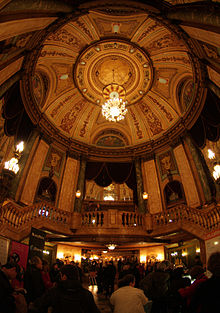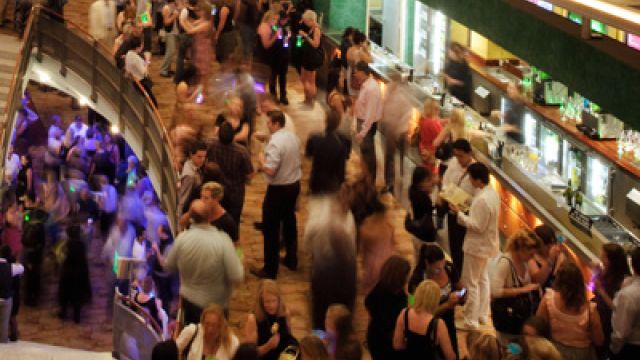To interval or not to interval …
That is the question posed by the Queensland Theatre Company’s Artistic Director Wesley Enoch in his blog. While the QTC is out to trim as many intervals as possible our Facebook followers disapproved, due mainly to a ‘wee’ problem.
It is a growing trend across the world to do away with the interval between acts in the theatre. At QTC this year we have about half of shows with intervals and half without (in fact we even had a show with two intervals). In some ways film has taught an audience a lot about how best to experience theatre. An average film is about 90 -110 mins long with many substantial films tipping the two hour mark. The arc of a story is served by the uninterrupted experience of sitting in the cinema or theatre and feeling the craft of the storytelling weave together the elements of production.
In Shakespeare’s day theatre was closer to three or four hours long and done in day light in the open air theatres like the Globe and the Rose and the Curtain, without an interval. For many, plays were experienced from the pit standing shoulder to shoulder with people who talked or sold oranges and generally milled around. Shakespeare’s plays were structured so that you had comic interludes or action scenes at strategic moments to keep your interest and create a rhythm for the audience. Many modern films do the same thing pacing out when to have special effects, car chases, explosions or gags.
I believe intervals are great moments to allow an audience a release or to signify a change of time or allow the audience to consider the ideas of the previous act before launching into the next series of ideas. …
What our Facebook followers said.

Wayne Smith: My 'middle-age' bladder' demands an interval, otherwise we'd never last the distance!
Jacki Kelly: Clearly an idea put forward by someone who has never seen a show whilst pregnant!
Alison Albany: I don't like being in a situation where I'm focusing on how much I need to pee and if it's possible to slip out rather than on the show and the performance.
Adam Ring: The issue of seat comfort should also be considered... an audience full of people continually shifting butt positions after 45 mins due to uncomfortable seats is distracting not only to the rest of the audience, but to the actors on stage. It lowers everyone's enjoyment of the performance.
Haki Crisden: If it's a lively, 90-minute musical, I'd say do away with the break but, as much as I love Les Misérables, I want an interval when I see it. Three+ hours with no chance to get fresh air into your lungs and move around is too conducive to dozing off.
Lauren Farquar: Doing away with an interval means the impact is lessened for the often show stopping close of first act or opening of the second act. What would Into the Woods or Phantom of the Opera be without the suspense at the end of act one?
Craig Stewart: The company/theatre should respect the authors. If the creators intended there to be an interval there should be one.
 David Hines: Having just completed a play in which I was on stage for the entire duration, and in a role which was quite emotionally charged, there is no way I'd want to do it without an intermission. Also the intermission allows people to reflect on and discuss Act 1. As Craig says, the author structures the show around a break as well. In the play I was just in there was a huge cliffhanger at the end of Act One which had the audience buzzing in the foyer. Why on earth would you want to lose that?
David Hines: Having just completed a play in which I was on stage for the entire duration, and in a role which was quite emotionally charged, there is no way I'd want to do it without an intermission. Also the intermission allows people to reflect on and discuss Act 1. As Craig says, the author structures the show around a break as well. In the play I was just in there was a huge cliffhanger at the end of Act One which had the audience buzzing in the foyer. Why on earth would you want to lose that?
Brett Riesling: An interval often means that the venue & production make more money in food, beverage and merchandise sales, thus the production pays less in venue hire, allowing for a lower ticket price for that show than would be possible with no interval. Obviously a comedian, one act play, shorter musical etc is better without interval for artistic and other reasons. A show written without a break generally leaves a gaping hole when an interval is added. We all have experienced this, I'm sure! Everything in moderation. :-)
Sherryl Spencer: From a financial point of view, intervals give struggling theatre companies an extra opportunity to make some cash on selling drinks and nibbles, rather than having to hike up ticket prices in order to cover the costs associated with staging a show.
John Willis-Richards: If you want audiences to give actors attention you need to give them an opportunity to stretching their legs. Failing that you lose most of your audience.
Byron Kolln: There's almost always a solid dramatic reason why most plays have an intermission - let's not try re-inventing or changing something that works.
Eric James: This must be another accountants' decision - one who doesn't drink and have to suffer 2-3 hours without a pit-stop. Maybe the bar-takings are not enough nowadays to justify paying staff? Anyway, definitely a poor decision, detracting from the audience's 'theatre experience'.
Sharleyne Diamond: Sometimes if the show is crap you need that interval just to will yourself to stay till the end.
Originally published in the July / August 2012 edition of Stage Whispers.
Subscribe to our E-Newsletter, buy our latest print edition or find a Performing Arts book at Book Nook.

